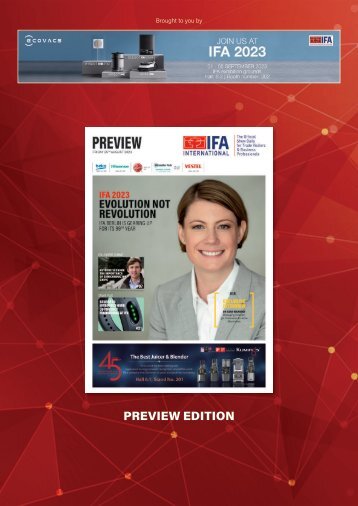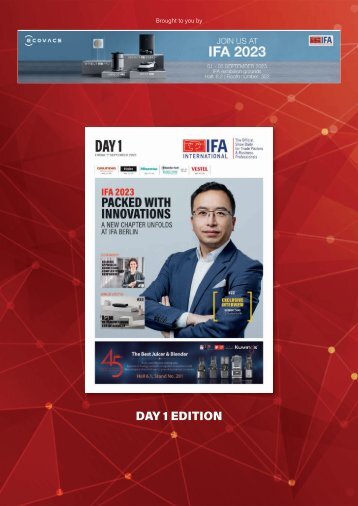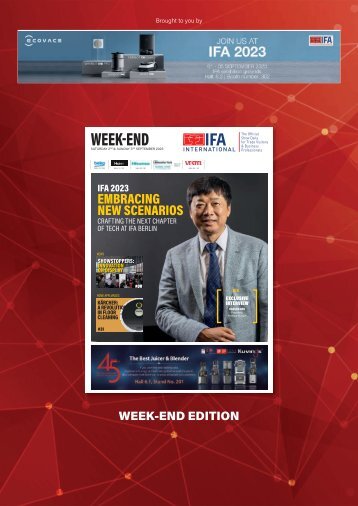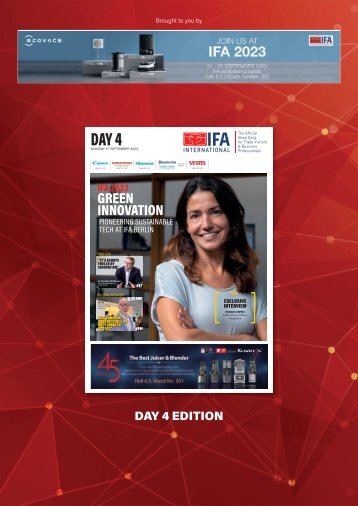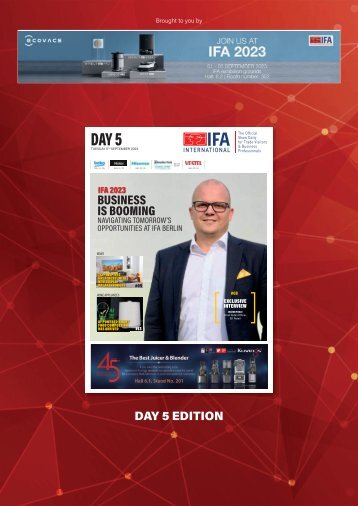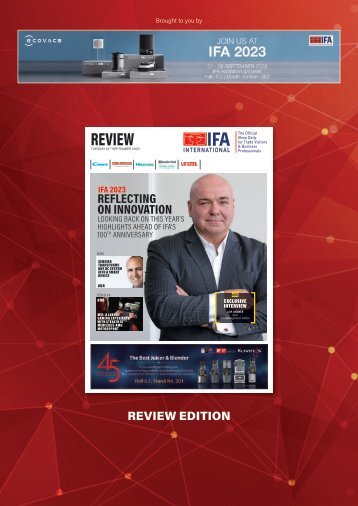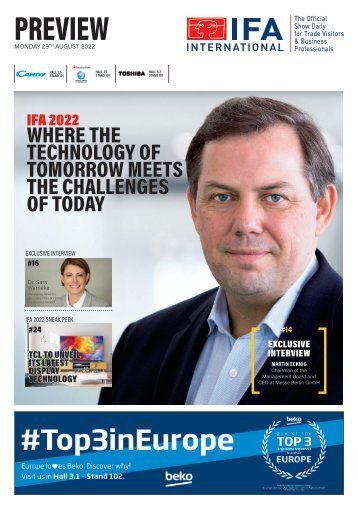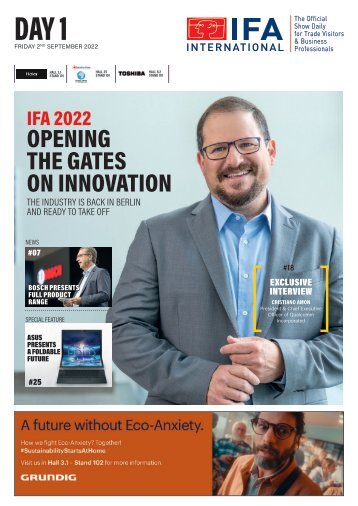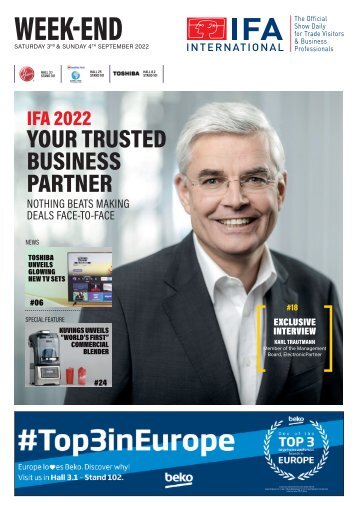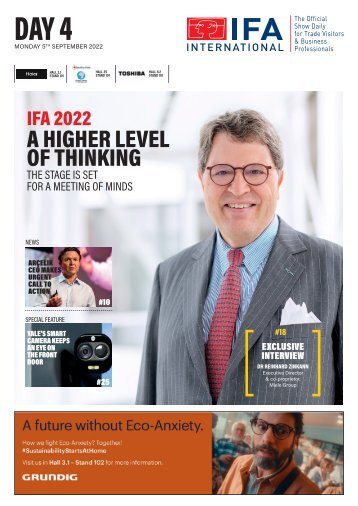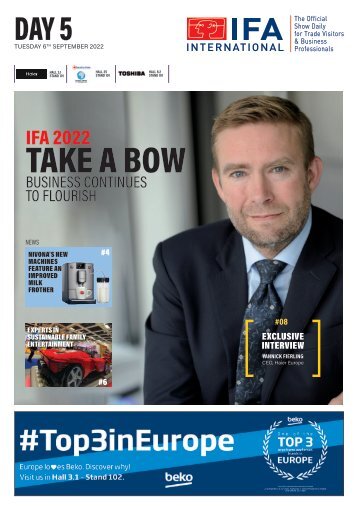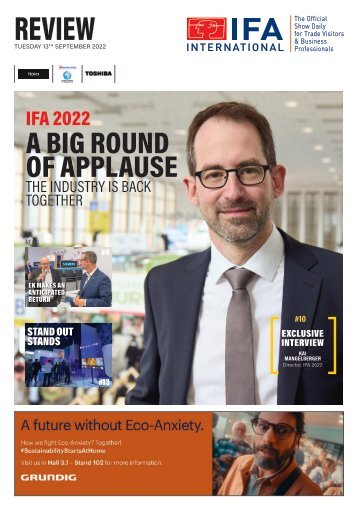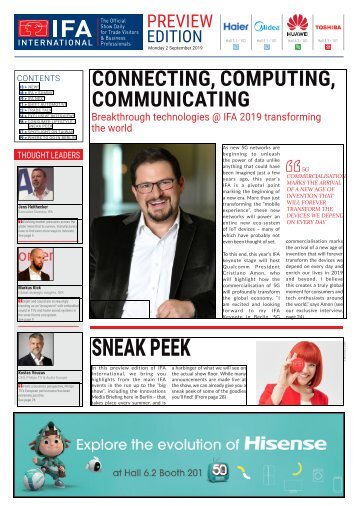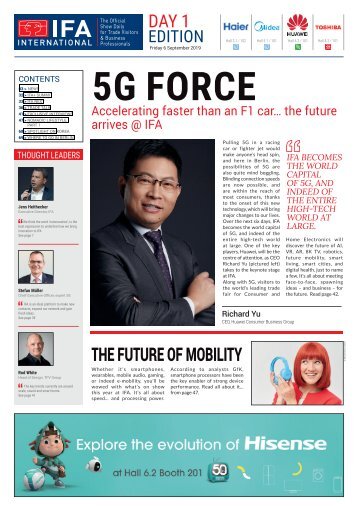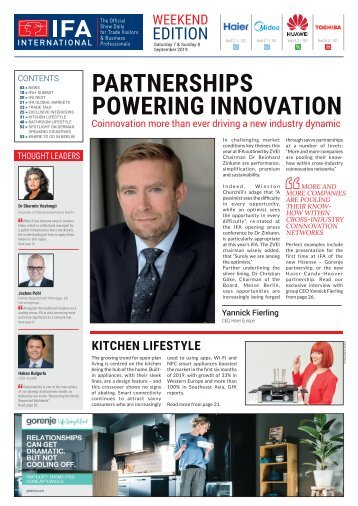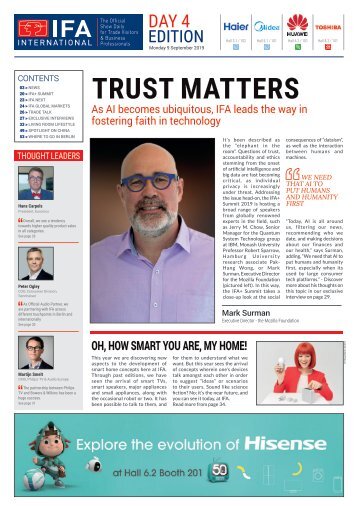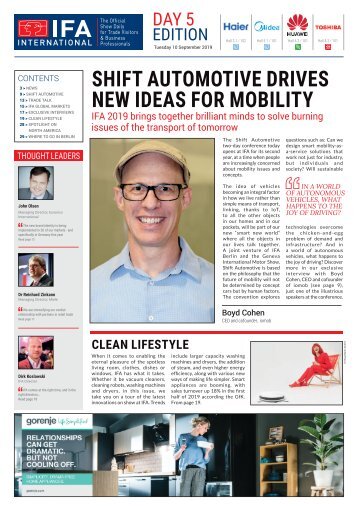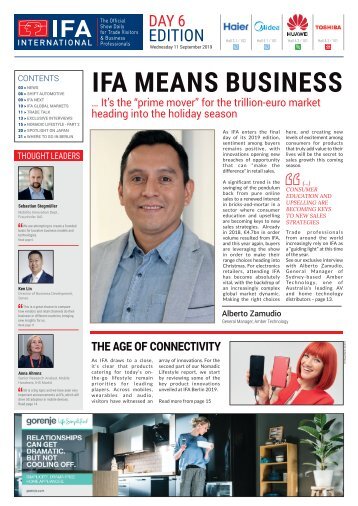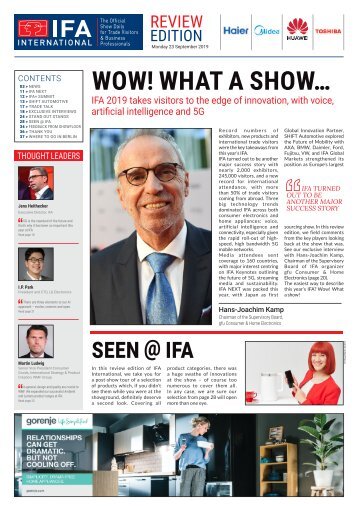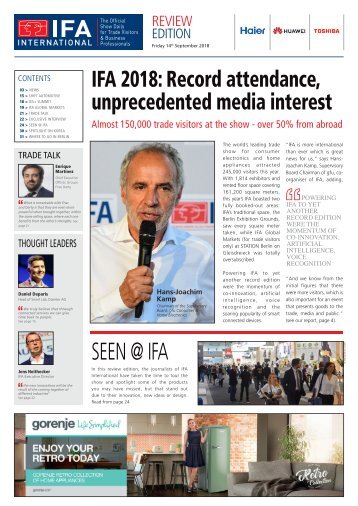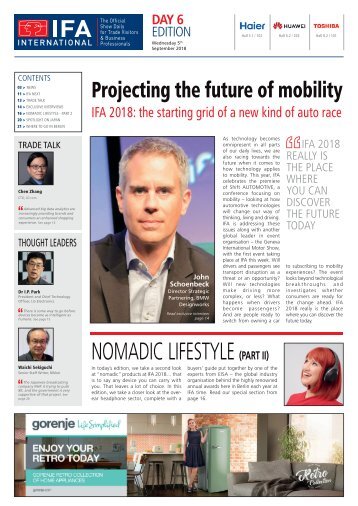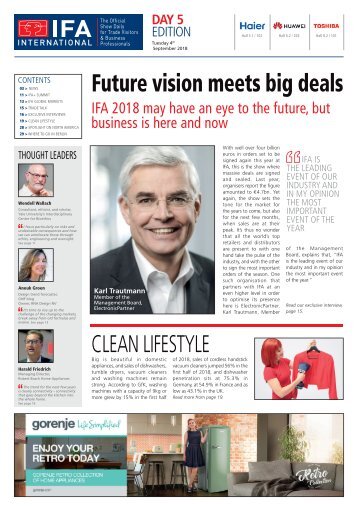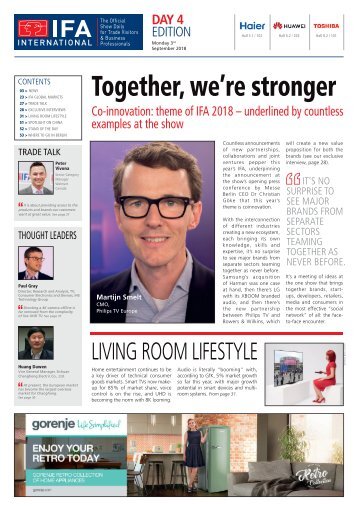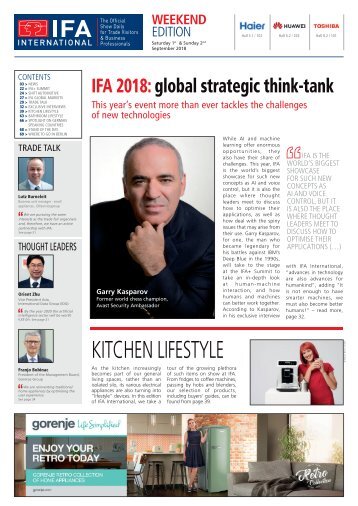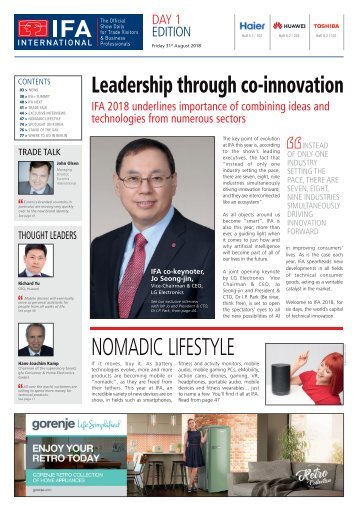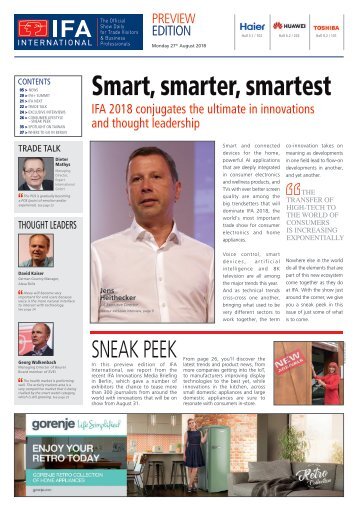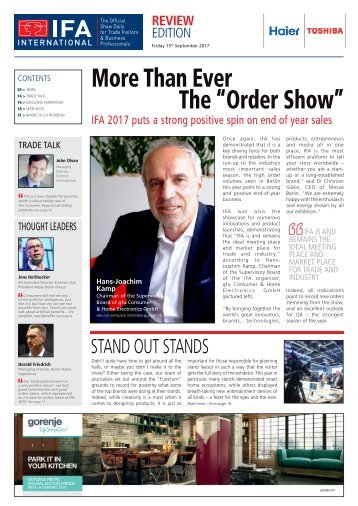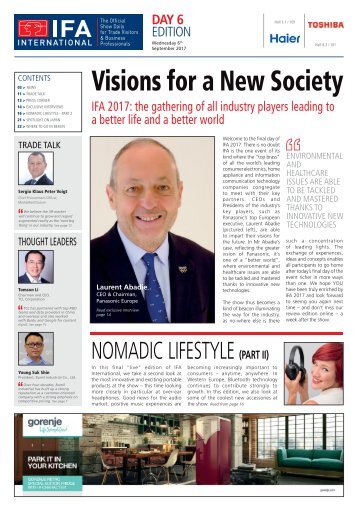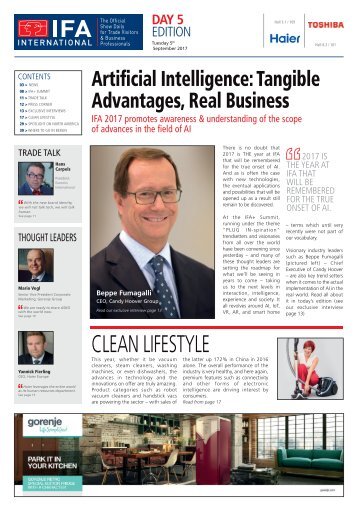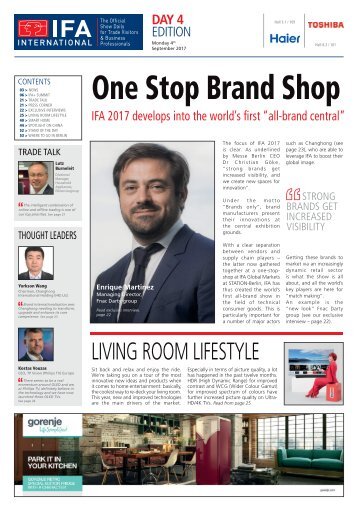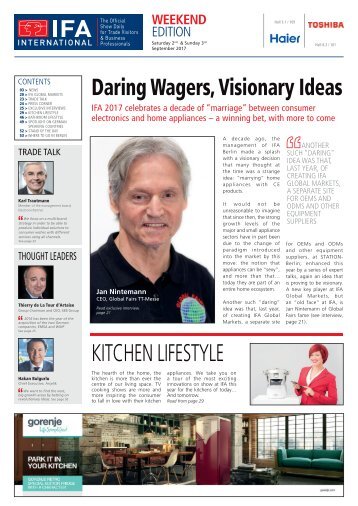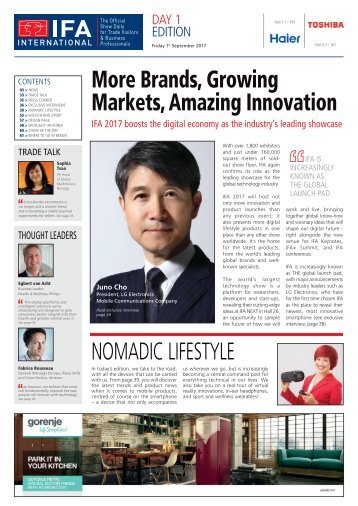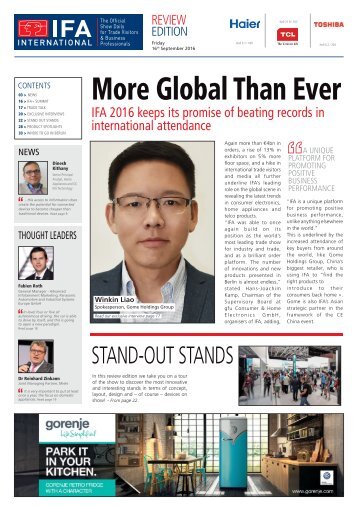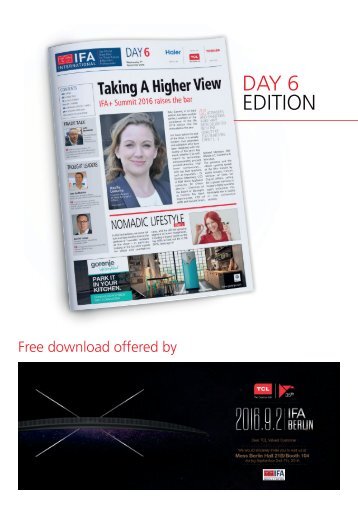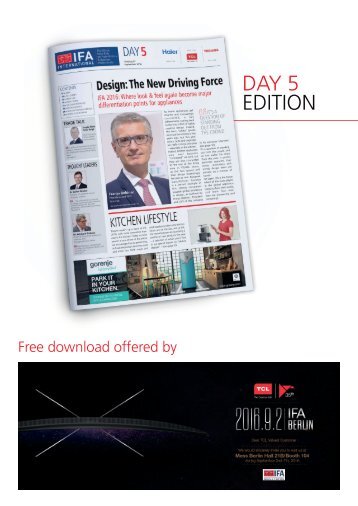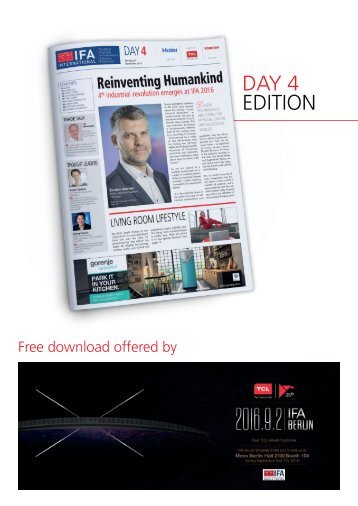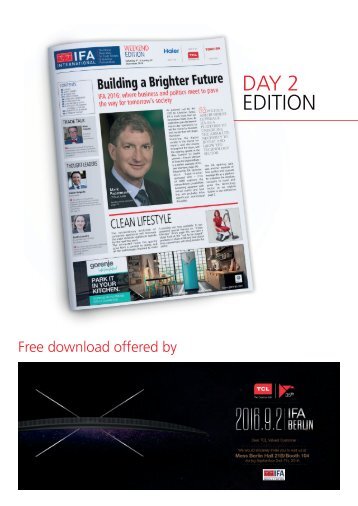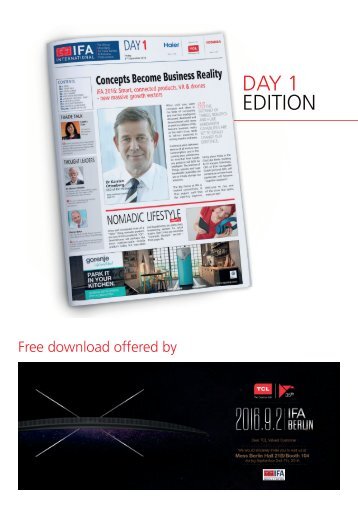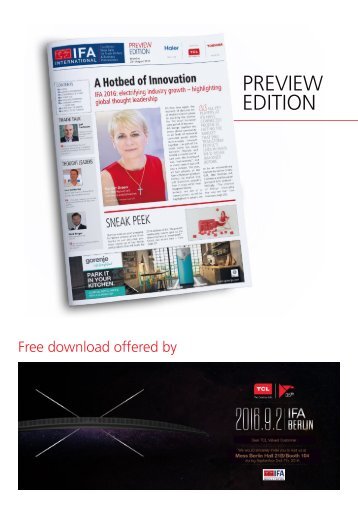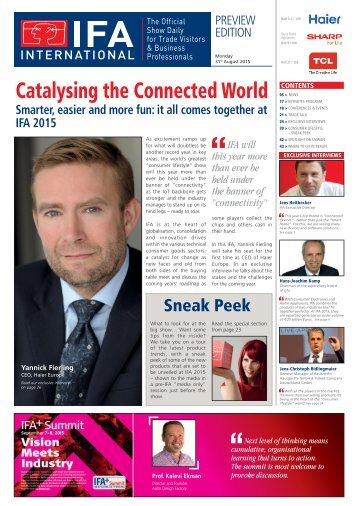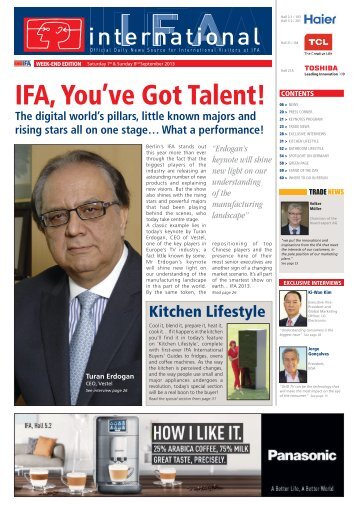
IFAINT22_REVIEW_Online
- Text
- Products
- September
- Marketing
- Sustainability
- Consumer
- Miele
- Berlin
- Global
- Appliances
- Deglobalisation
- Www.cleverdis.com
IFA+ Summit 2022 IN THE
IFA+ Summit 2022 IN THE FACE OF DISRUPTION De/Globalization The Universal Remedy? Peter Sloterdijk, Philosopher IFA+ Summit thought leaders discuss risks and rewards of deglobalisation Deglobalisation, digitisation and sustainability were the main themes of the IFA+ Summit 2022, IFA's dedicated digital future think-tank. Opening the event, representatives described IFA as a place not only to do business and showcase the latest innovations, but also to discuss the latest developments in our economy, ecology and societies. Summarising the most recent challenges - climate change, coronavirus, the invasion of Ukraine and rising energy costs - the audience took a deep dive into Monday's motto: deglobalisation, the universal remedy? Distinguished speakers took to the stage on Monday, including the world renowned philosopher Prof Peter Sloterdijk, who delivered a sobering speech on the "historical restlessness of the contemporary world" and "witnessing through disruption." Recalling how German Chancellor Olaf Scholz announced a 'turn of the tide' following the Russian invasion of Ukraine, he said: "A new vector in the course of world events had broken." A similar tendency, he proclaimed, could be observed through French President Emmanuel Macron's speech at the Élysée last month and his call to be prepared for three calamitous changes: the end of abundance, the end of the self evident, and the end of indifference. The philosopher later pondered the pandemic border closures as a "premonition of the potential destination of deglobalisation" and said he is "convinced" that technology advances hold solutions to the environmental crisis. Additional morning events included comments from Professor Ronny Fürst, of AKAD University, on the possibility of deglobalisation and its risks. Research on consumer sentiment towards globalisation was presented by Dr Sara Warneke, MD at gfu Consumer & Home Electronics. A panel discussion on globalisation vs deglobalisation was then held between delegates from Greenpeace, diffferent strategy consultancy, DIHK, and DIW Berlin. Also on the IFA+ Summit stage was Prof Lisandra Flach, of the ifo Institute, who took the audience on a deep dive of supply chains and the importance of nearshoring. Innovation expert Jule Bosch spoke on issues of sustainability and whether deglobalisation has the power to save the environment followed by a talk with Germany's minister for the environment Jurgen Trittin. Joyce Gesing, CCO of Severin, later presented a thought provoking case study on resiliency and transformation in the face of deglobalisation Deglobalisation and the reshoring approach Professor Ronny Alexander Fürst, AKAD University in Germany, explored tensions between the economy, sustainability and political interests at the IFA+ Summit. "Globalisation will continue... will increase and continue to add value to all of us," Prof Fürst stated first and foremost. He highlighted how the highly talked about phenomenon has contributed towards the decentralisation of economic power and crisis impact, with no single territory having more than 20% of the world's GDP. Reshoring is a common approach, Prof Fürst said, referencing the trend of regionalisation to develop global crisis resilience. He also spoke about a new world with new challenges along with his thesis on how digital leadership and a readiness to develop can create an ability to overcome global crisis 8 IFA INTERNATIONAL • TUESDAY 13 TH SEPTEMBER 2022 news.ifa-berlin.com
Key research: Consumer sentiment towards globalisation IFA+ Summit 2022 THE WAY BACK HOME? International Consumer Study on Globalization in Consumer & Home Electronics Dr. Sara Warneke, gfu Consumer & Home Electronic Top level speakers including Miele chief and former Greek finance minister headline at IFA+ Summit Dr Reinhard Zinkann, executive director and co-proprietor of Miele Group, and former Greek finance minister Professor Dr Yanis Varoufakis spoke at the highly anticipated event. On Monday afternoon, Dr Zinkann shared his views on deglobalisation under the motto the 'next level of thinking.' The Miele co-owner reflected on how the global industry has long benefited from globalised production, supply and sales structures which he believes, on balance, will continue. However, the strong focus on costs that has underpinned it to date will tend to diminish in the future, he added. Commenting on one of the key topics of the summit - friend-shoring - Dr Zinkann speculated that protection against geopolitical risks is likely to become more important. The risks of deglobalisation, he believes, could come with the "unbundling of global supply chains" - a lengthy, laborious and costly process by nature, he said. The availability of raw materials is another factor but a process which Miele handles "with great care," he added. Despite the challenges, the Dr Zinkann said deglobalisation could also present opportunities, "especially if shorter distances can reduce complexity, logistics costs and CO2." It would also offer production opportunities for high-wage countries such as Germany, he added. Prof Varoufakis said globalisation is facing "a major challenge" and addressed the question of what needs to be done. "We are missing the point," the former finance minister urged. Identifying globalisation together with trade is "a huge error," he said, a point he stressed more than once during his speech. Prof Varoufakis also outlined the reasons why he believes reshoring is not in the interest of either nation states or developing countries, and instead advocated for the intensifying of trade and supply chains Dr Sara Warneke, MD, gfu Consumer & Home Electronics, discussed the 'The Way Back Home' at the IFA+ Summit. The representative study, conducted in August, compares consumer sentiment towards globalisation in China, France, Germany, India and the US resulting from the global political situation. The study revealed scepticism towards globalisation as a worldwide phenomenon, which was more significant among respondents in India and France. Nine times more respondents were critical of globalisation than not in India, compared to more than half in Germany, and less than half in the US and China. Regarding demographics, the study found that male consumers, and consumers who are younger and more educated, tend to be more sceptical of globalisation, while differences in income for resondents do not seem to influence attitudes. Consumer concerns include interrelationships and dependencies between countries. This stems largely from the restricted supply of goods manufactured overseas during Covid, and the global implications of the Russia-Ukraine conflict. A second concern is sustainability, with France among the countries that find globalisation to be bad for sustainability, especially when considering the shipping of goods and global energy consumption. Overall, 75% of study participants said buying locally-made products had become more important. Almost two thirds of respondents now prefer local brands, and two thirds are increasingly interested in where materials, components and parts of products come from. While consumers in China and India have 75% OF STUDY PARTICIPANTS SAID BUYING LOCALLY- MADE PRODUCTS HAD BECOME MORE IMPORTANT always had a high awareness of the origin of a brand, the study noted a very strong shift towards a higher awareness in Germany, France and the US. Dr Warneke commented: "There is a clear trend among consumers to shift their purchasing decisions more in the direction of domestic brands" IFA INTERNATIONAL • TUESDAY 13 TH SEPTEMBER 2022 9
- Page 1 and 2: REVIEW TUESDAY 13 TH SEPTEMBER 2022
- Page 4 and 5: I NEWS I “IFA again at last!” E
- Page 6 and 7: I NEWS I Mic check: IFA 2022 press
- Page 10 and 11: I EXCLUSIVE INTERVIEW I BEFORE, COM
- Page 13 and 14: SEEN @ IFA I SPECIAL FEATURE I STAN
- Page 15 and 16: SEEN @ IFA I SPECIAL FEATURE I Virt
- Page 17 and 18: MAKE IT YOUR PLAYGROUND 190,000 sqm
Inappropriate
Loading...
Mail this publication
Loading...
Embed
Loading...

IFA International
- IFA International 2023
- IFA International 2022
- IFA International 2020
- IFA International 2019
- IFA International 2018
- IFA International 2017
- IFA International 2016
- IFA International 2015
- IFA International 2014
- IFA International 2013
- IFA International 2012
- IFA International 2011
- IFA International 2010
- IFA International 2009
- IFA International 2008
- IFA International 2007
